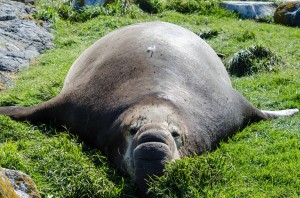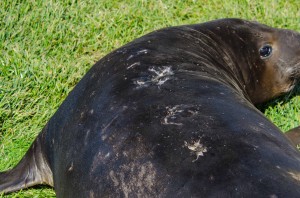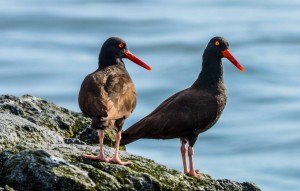The big boss is back. Misery (Mystery as I like to call him) has returned to the island and has been snoozing and rolling his generous bulk around the grassy areas. He appears to have gained 100 kgs or more in his time away. Wherever they are going after their onshore fasting, and it can’t be too far, the seals appear to have no problem finding abundant food resources. Fortunate for them that their prey is at a depth most predators can’t reach, nor is that prey (squids, skates, rays and some crustaceans) commercially hunted. Elephant seals appear to love grass, which is unusual as most of the places they live don’t have any vegetation. But their pleasure is apparent to anyone who watches them. Yesterday there were 10 individuals here, a new record.
The younger bull Chunk (named for the hideous propeller scars on his back) stays out of the way but Misery seems less aggressive without any potentially fertile females around. A new juvenile with the tag 6355 showed up today.
It is hard to tell if the oystercatchers have laid their eggs yet because they are so secretive about their nests, and use very vocal and visual threat displays to distract would be predators and naturalists. Normally 2 to 3 eggs are laid in this nest, these are very hard and can even survive being submerged by a high tide or very high water levels. Incubation takes around 26–28 days. The chicks are capable of leaving the nest after one day. I once witness an acquaintance of mine accidentally step on an oystercatcher nest and crush an egg. He was devastated but not as much as the bird. She clearly knew we were responsible and proceeded to fly after us carrying shards of egg in her beak and screaming what I took to be obscenities at us. I don’t blame her at all. Remarkably she repeatedly flew ahead of us with the broken egg, landed on the beach and vocalized, until our guilt forced us to flee the island. That bird recognized cause and effect!
Aneri and Sahar are staying here for a few days and they have been great company. They are so much more consciously evolved than my generation was at that age and they give me hope that many of the antiquated paradigms of our culture will go extinct and we can progress to 21st century thinking to solve 21st century problems. I shall miss them when they leave tomorrow. They have helped me prop up some of the solar panels, washed windows, swept walks, and made some tasty brownies!


